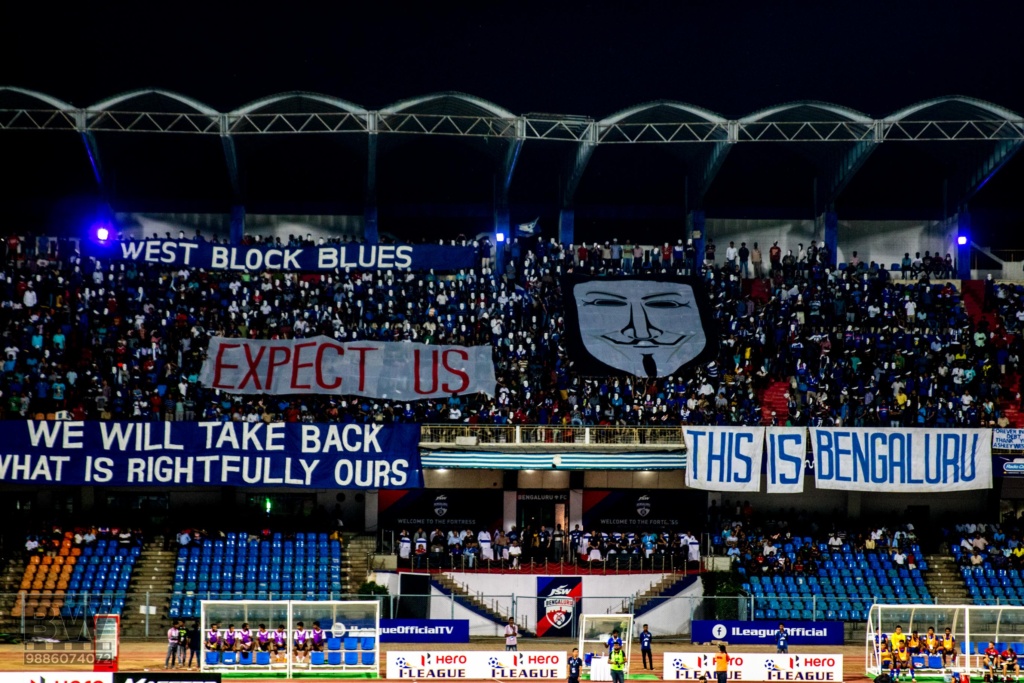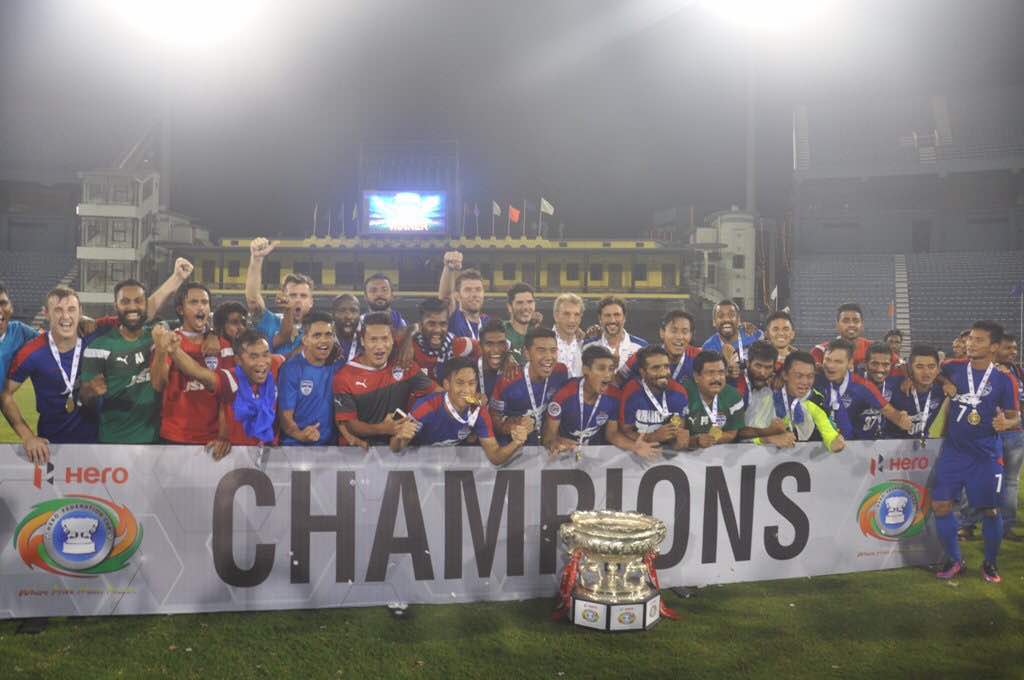Bengaluru Football Club added a mental health expert on their team to address an important aspect of sport.

First published: https://www.vice.com/en/article/wxqwjy/football-club-bengaluru-fc-is-getting-mental-health-experts
An Indian Football Club Just Added Mental Health Experts to The Team
It’s easy to think of athletes as superhumans whose concerns are different from ours. But Bengaluru FC is addressing the mental health of its players who, ultimately, are just as real as us.
In January, 20-year-old Suresh Singh Wangjam made his first team debut with football club Bengaluru FC (BFC) in the Indian Super League (ISL). The performance was impressive and he soon became a permanent fixture in coach Carles Cuadrat’s plans, featuring in every game for the rest of the season.
Going into the second leg of the semi-final against Atletico de Kolkata (ATK) with a slender 1-0 lead, the coach had given Wangjam clear instructions once he switched to the right-back position. He gauged that the attackers would be looking to go down in the box and score themselves a penalty, so he advised Wangjam to avoid the tackle and instead, allow them a shot at goal.
Wangjam put on a tight performance until the 63rd minute when he brought down ATK’s David Williams and conceded a penalty. In that moment, the tide had turned and BFC failed to make the final—their first season without a trophy since their inception in 2013.
“It hurts me even today because that penalty gave them the momentum,” Wangjam recalls. “After the game, I spoke to my father and friends back home in Manipur to tell them how bad I was feeling.”
hed down by their thoughts until it might spiral out of control into something completely different.
On World Mental Health Day today, BFC is launching a programme called “Care Around the Corner” to raise awareness on the issue of mental health. In the weeks ahead, they will bring on board mental health experts, who will be accessible to anyone who needs attention on matters that go beyond the scope of the football pitch. This is in line with other sports teams in India—like cricket team Royal Challengers Bangalore—investing in getting experts during a time when our collective mental health has been deeply impacted.

There were occasions when media manager Kunaal Majgaonkar had been witness to troubled minds around him. After he read Robert Enke’s story—the former German goalkeeper took his own life in 2009 after battling depression—he decided to raise the issue with the club.
It took four months of research to understand the subject, before club CEO, Mandar Tamhane, figured that mental health went beyond the scope of just sports psychology.
“Realising that there is a problem is the first hurdle. And to have professionals available who can address the issue. There is limited awareness on the subject,” Tamhane says.
“Take [actor] Sushant Singh Rajput’s case. Why would such a brilliant individual who is good at what he’s doing want to end his life? It’s hard to understand what a person is going through, maybe something from his personal life that spills on to the professional front or the other way around,” he adds.
Through their tie-up with Scottish football club, Rangers FC, they will get experts to explain mental health to the team and the support staff, who often lend an ear to the boys’ thoughts during a massage session or while analysing a player’s performance.
Rangers FC first created the “Care Team” in September 2019 to help those associated with the club maintain good mental health. “We recognised that different life events can pose challenges and impact a person’s mental health,” says Arlene Sinclair of Rangers FC. “Support may be face-to-face or over a telephonic chat. There is an automatic referral for long-term injured players as we recognise the impact that the injury may have on them.”
28-year-old BFC goalkeeper, Gurpreet Singh Sandhu, remembers conceding goals at crucial times early on in his career. On one such occasion, he let the ball slip through his legs and as he walked off the pitch, and was at the receiving end of a verbal volley of boos and abuses from the crowd.
“I couldn’t see myself in the mirror for days and cried, but no one saw that. As a young player, you keep blaming yourself, though over time, I have learnt better coping mechanisms. Not sharing your feelings can be toxic for your mental health and it’s okay to talk to others about it,” he says.

Sandhu first visited a mental health professional after being pushed by his partner to “just go talk”. He says it helped him open up and wishes to do the sessions more often.
“As a society we create this stigma that it’s a bad thing to visit a professional,” Sandhu says. “Let me tell you it isn’t. It’s the most normal thing, just like going to your barber. A mental health expert at the club will be an opportunity to have a better understanding about yourself. As men and football players, we are always told to be strong and not feel anything. I think it is important to have a safe, non-judgemental space at a professional club, so that players can be vulnerable.”
Across the globe, sportspersons have come forward to reveal their struggles with mental health—everything from depression, stress and anxiety-related issues—that are at times a consequence of their relentless drive for perfection and on other occasions, have nothing to do with sport.
At the peak of his career, former World No. 4, Robin Soderling, decided to quit tennis. It took him nine years to fight off anxiety and panic attacks, and rediscover himself. In 2018, record-setting swimmer, Michael Phelps, said that he “fell into a major state of depression” after every Olympics and even contemplated suicide, before realising that he needed help. Footballer Tony Adams had his own battle with alcohol during his playing days and went on to start a charity, Sporting Chance, that addresses mental health issues through counselling, treatment and by spreading awareness.
A number of world sports bodies have realised the need to attend to mental health over the past few years. In May, the Association of Tennis Professionals tied up with Sporting Chance and Head Space (an organisation that deals with mindfulness, meditation and mental fitness) to support the mental health and wellbeing of its players and staff’. Last month, Cricket Australia appointed a mental health manager and introduced boxing sessions to help players cope with life in a bubble when they host India in December for a Test and ODI series. To put the spotlight on the illness, the FA Cup final played out in August was dedicated to Heads Up—a partnership between the Football Association and Heads Together (a mental health initiative spearheaded by The Royal Foundation of The Duke and Duchess of Cambridge) that looks to change the conversation on mental health through football.
According to a study conducted by Sporting Chance, 464 members of the Professional Footballers’ Association accessed their counselling services this year until September, as compared to just 160 in 2016. This, when the Covid-19 pandemic brought most sporting activities to a temporary halt for months, putting livelihoods at risk.
Like a number of events across the world that have resumed without fans, the ISL gears up for a “season in the bubble” come November. All matches will be played in Goa instead of the usual home-away format, with teams operating in a protected environment until the tournament ends in March.
The four-month period away from family and friends while enduring the monotony of shuttling between hotel and grounds is likely to be a mental test for players as well as the support staff.
“It’s tough mentally to cope with such a huge change, so I’m confident that a professional being part of the team will help,” Sandhu says.
Repercussions of a pandemic aside, the pressure of performance will always be a constant as 23-year-old Parag Shrivas has realised. During the AFC Champions League second leg in February against a Maldivian club, he was called upon to take a sudden death penalty. He felt confident as he stepped up, but fluffed his spot kick moments later. As he walked back to his teammates, he felt dizzy and his world came crashing down.
“My head was spinning as I thought about what people would have to say to me and how I would face the rest of the team,” Shrivas recalls.
Though he’s over that moment and is confident of scoring a penalty the next time around, there are times he thinks about it even today. Now though, help is just around the corner at BFC. And hopefully, with all other sports clubs and teams soon too.